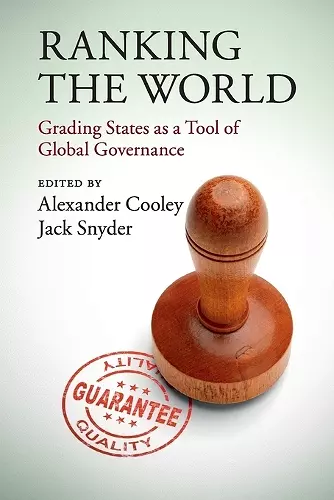Ranking the World
Grading States as a Tool of Global Governance
Jack Snyder editor Alexander Cooley editor
Format:Paperback
Publisher:Cambridge University Press
Published:20th Oct '16
Currently unavailable, and unfortunately no date known when it will be back
This paperback is available in another edition too:
- Hardback£90.00(9781107098138)

This book examines the origins of the rise of international rankings, assessing their impact on global governance, and exploring how governments react to being ranked.
Global actors publicly rank state performance in areas such as corruption, quality of democracy, creditworthiness, media openness and/or business environment. These international rankings always carry value judgments, methodological choices, and political agendas. This volume addresses the theoretical, normative and policy issues associated with 'grading states'.Over the last decade, international rankings have emerged as a critical tool used by international actors engaged in global governance. State practices and performance are now judged by a number of high-profile indices, including assessments of their levels of corruption, quality of democracy, creditworthiness, media freedom, and business environment. However, these rankings always carry value judgments, methodological choices, and implicit political agendas. This volume expertly addresses the important analytical, normative, and policy issues associated with the contemporary practice of 'grading states'. The chapters explore how rankings affect our perceptions of state performance, how states react to being ranked, why some rankings exert more global influence than others, and how states have come to strategize and respond to these public judgments. The book also critically examines how treating state rankings like popular consumer choice indices may actually lead policymakers to internalize questionable normative assumptions and lead to poorer, not improved, public policy outcomes.
'Ranking the World is a truly unique contribution - the 'top ranked' book of its kind since I cannot think of another quite like it. It is a must read for anyone interested in the increasingly important politics of rankings in international relations.' Peter Andreas, John Hay Professor of Political Science and International Studies, Brown University, Rhode Island
'Since the 1970s, ratings and rankings have become an ever-present feature of life in most developed and transitional societies. These ubiquitous measures reflect the 'powerful allure of the technocratic model of policy evaluation and performance accountability', write the editors of this outstanding collection of chapters unearthing the dark underbelly of ratings politics. Covering democracy, state failure, corruption, press freedom and investment, the various authors argue forcefully that, despite their methodological flaws, systematic biases and susceptibility to manipulation, ratings and rankings now cause political and economic change as much as reflect it. The use of simplistic numerical grades as substitutes for informed debate about policy priorities and effectiveness, outlined in this highly original and important book, should concern us all.' Stephen Hopgood, School of Oriental and African Studies, University of London
ISBN: 9781107484122
Dimensions: 228mm x 151mm x 14mm
Weight: 380g
256 pages